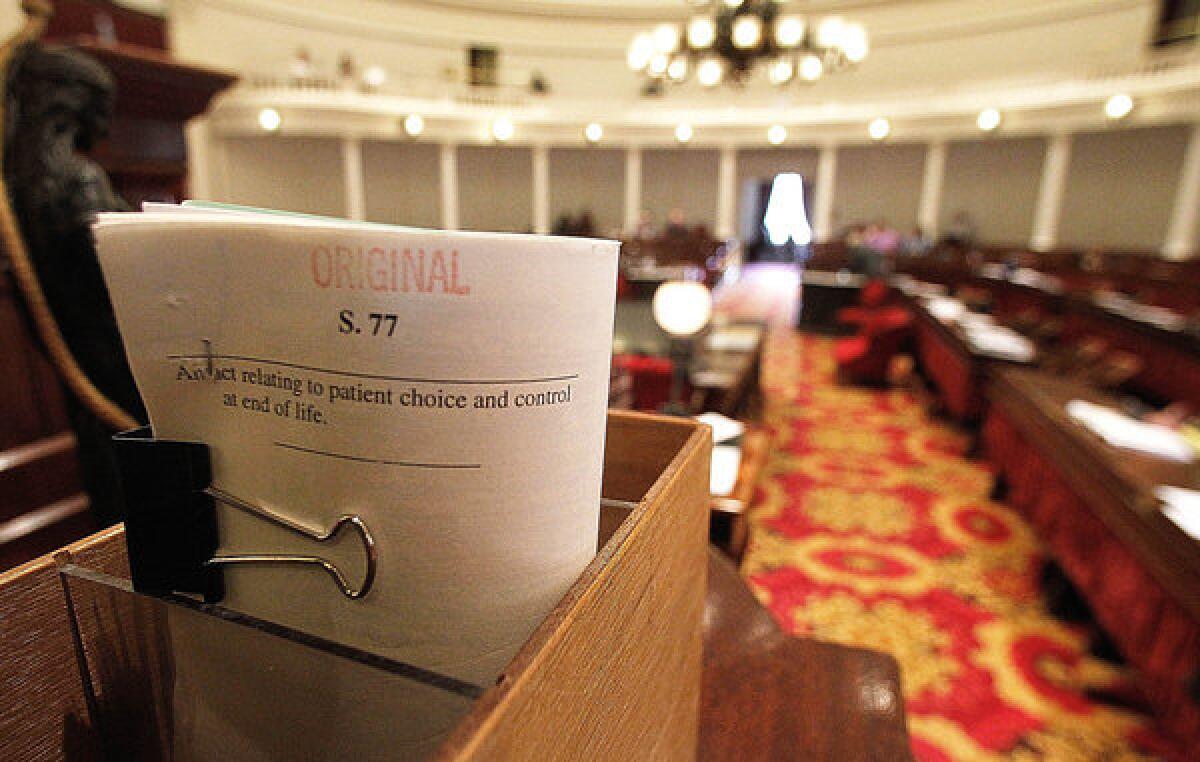Vermont House OKs right-to-die bill; governor expected to sign it

- Share via
Vermont is on track to become the fourth state to allow severely ill patients to end their lives under medical supervision.
The state’s House of Representatives voted 75 to 65 on Monday night to approve the “Patient Choice at End of Life” measure. The legislation, passed by the Senate in February, now goes to Gov. Peter Shumlin, who said he would sign it.
If he does, it will make Vermont the first state to approve such a measure through state lawmakers. Oregon and Washington enacted their laws through a referendum, and a Montana Supreme Court decision made it legal in that state.
For the governor, Vermont’s bill “is about giving people comfort that they might have the option of avoiding excruciating pain.”
Shumlin said his mother visited him at the Legislature in Montpelier recently and asked him how the bill was going.
“She said, ‘I don’t think I’d ever use it, no matter how much pain I’m in, but it would give me peace of mind knowing I could,’ ” the governor told The Times.
The law would take effect immediately with the governor’s signature.
Though the bill appears to be headed for the books, its path there has been anything but inevitable. Contention from both sides of the right-to-die issue has caused the bill to perish and be resurrected several times over the last decade.
Some of the opposition came from groups such as the Vermont Alliance for Ethical Healthcare and True Dignity Vermont, which argue that “killing is not compassion” and that patients could be pressured into ending their lives. On Tuesday, True Dignity Vermont’s website urged the state’s residents to call the governor’s office and demand that Shumlin veto the bill.
“Our organization and our members and lots of other people in this state are disappointed,” said Edward Mahoney of the Vermont Alliance for Ethical Healthcare.
Mahoney said some opponents could probably live with the bill if it were more like Oregon’s system, with a longer chain of protections, he said, than what the Vermont Legislature approved.
“The Senate put together a real hodgepodge of a bill.... I don’t know that anyone’s really happy with it, even those who voted for it,” he said.
Debate on how best to administer physician-assisted suicide led to heavy revisions in the Senate before the bill passed there, 17 to 13; the Senate’s five-member Committee on Health and Welfare sponsored the legislation.
In its final form, the legislation allows for an end-of-life process with the consent of a patient’s doctor after the patient has made more than one request for help in ending his or her life, and has then had a chance to retract the request.
More than 10 years ago, proponent Dick Walters founded Patient Choice Vermont, a group that advocates physician-assisted suicide.
“It took us a heck of a lot longer than we hoped it would. But this is a huge thing,” Walters told The Times on Tuesday. “It’s not just the legislation. It’s the different atmosphere surrounding end-of-life issues.”
Since Oregon’s law passed about 15 years ago, the medical establishment began to change its views, Walters said, which affected “the whole continuum of end-of-life care.... It opened up a dialogue for a more effective communication between patients and doctors. We expect those same things will occur in Vermont after passage.”
ALSO:
Prince Harry tours Sandy-battered New Jersey shore
Parade shooting: New Orleans police seek teen suspect
N.J. father arrested after son, 4, shoots and kills playmate
More to Read
Sign up for Essential California
The most important California stories and recommendations in your inbox every morning.
You may occasionally receive promotional content from the Los Angeles Times.










